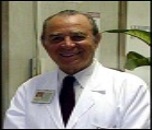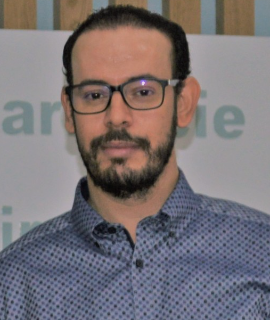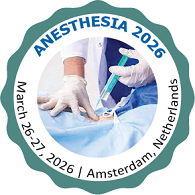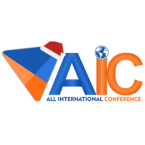Welcome Message
It is a great pleasure to welcome participants from across the globe to attend the “12th World Congress on Anesthesia and Critical Care”, which will be held on March 26–27, 2026 in Amsterdam, Netherlands with the theme “Global Excellence in Critical Care and Perioperative Medicine.” This prestigious event provides an exceptional opportunity to explore the latest innovations and advancements in Anesthesia, Critical Care, and Perioperative Medicine. With distinguished keynote speakers sharing their expertise and perspectives, this gathering promises to be an inspiring and intellectually enriching experience. We warmly invite all professionals, researchers, and academics to contribute their insights and findings to advance the field.
Anesthesia 2026 serves as a dynamic platform for the exchange of ideas, fostering collaborations, and promoting academic growth. It offers a unique space for emerging and established professionals to enhance their knowledge and share best practices. Delegates will benefit from a rich scientific program featuring keynote lectures, oral presentations, poster sessions, workshops, and exhibitions. We extend our warm invitation to Anesthesiologists, Critical Care Specialists, Intensivists, Surgeons, Anesthesia Fellows and Residents, Pain Medicine Experts, Researchers, Professors, Physicians, Healthcare Professionals, Medical Students, and members of all related associations and academic institutions to join us in Amsterdam for this exceptional scientific gathering.
About Conference
The 12th World Congress on Anesthesia and Critical Care will be held on March 26–27, 2026 in the dynamic city of Amsterdam, Netherlands. This prestigious global event serves as a premier platform for anesthesiologists, intensivists, perioperative specialists, pain medicine experts, critical care nurses, researchers, and industry leaders to exchange ideas, share research, and advance patient care.
Under the theme "Global Excellence in Critical Care and Perioperative Medicine", the congress will highlight the latest innovations, clinical practices, and scientific breakthroughs shaping the future of anesthesia and intensive care medicine. Participants will engage in thought-provoking keynote lectures, interactive panel discussions, hands-on workshops, and case-based learning sessions led by renowned international experts.
The Anesthesia 2026 event also offers unparalleled networking opportunities, fostering collaborations that transcend geographical boundaries. Whether you are seeking to update your knowledge, present your research, explore industry innovations, or build professional connections, this congress promises a rich and rewarding experience.
Join us in Amsterdam and be part of a global movement dedicated to improving patient safety, enhancing clinical outcomes, and driving excellence in anesthesia and critical care.
Featured in Anesthesia 2026:
-
Workshop
-
Keynote & Plenary sessions
-
Young researcher’s forum
-
Symposium
-
Exhibitor booths
-
Separate room for B2B meetings
-
Research excellence award
-
Best poster competition
-
Young Scientist Award
Why to Attend?
The Anesthesia 2026 is a must-attend event for anyone committed to advancing perioperative and intensive care medicine. This prestigious congress unites global leaders, researchers, and clinicians to share insights, discuss cutting-edge innovations, and explore emerging trends that are shaping the future of patient care. Through keynote lectures, panel discussions, and practical workshops, participants will gain valuable knowledge, discover evidence-based strategies, and enhance their professional expertise.
In addition to its rich scientific program, the congress offers an excellent platform to present research, build international collaborations, and participate in interactive training sessions. Beyond the professional experience, attendees will have the opportunity to immerse themselves in the vibrant culture, scenic canals, and historic charm of Amsterdam, making this a truly rewarding event for both personal and career growth.
Benefits of Attending
-
Workshops on latest techniques and practices
-
Keynote & plenary sessions by global experts
-
Young researchers’ forum for emerging talents
-
Symposiums on specialized topics
-
Exhibitor booths showcasing innovations
-
B2B meeting space for collaborations
-
Research excellence award recognition
-
Best poster competition for outstanding work
-
Young Scientist Award for exceptional research
-
CPD credits with participation certificate
-
Google-indexed speaker & abstract pages for visibility
-
Library of Abstracts with 30K+ monthly visits
-
Interactive meetings with peers and experts
-
Networking with leaders in anesthesia & critical care
-
One-on-one discussions with keynote speakers
-
Learn from world authorities in the field
Target Audience
-
Anesthesiologists
-
Anesthesia Technicians/ Nurses (Anesthetists)
-
Pain Medicine Consultants/ Specialists and Intensivists
-
Critical Care/ICU Nurses
-
Institutes/Medical Schools Students
-
Pharmacists
-
Physicians
-
Clinical Researchers
-
Scientists
-
Research Scholars
-
Anesthesia Educators
-
General practitioners
-
Healthcare Innovators
-
R&D Companies
-
Healthcare companies
-
Entrepreneurs
-
Manufacturing Medical Devices Companies
-
Life Science Investors
-
Nutritionists
-
Dietitians
-
Students of Medicine Disciplines
-
Upcoming Researchers
-
Societies of Anesthesia
Sessions and Tracks
Track 1: Anesthesia and Anesthetics
Anesthesia is a vital component of modern medicine, allowing a wide range of medical and surgical procedures to be performed safely and without pain. It involves the use of anesthetic drugs to induce a temporary loss of sensation or awareness, ensuring patient comfort and safety during interventions. These drugs act by interfering with nerve impulses or affecting the central nervous system to block the sensation of pain. Continuous advancements in anesthetic techniques, delivery systems, and safety protocols have significantly enhanced patient outcomes and minimized risks during procedures.
-
General anesthesia
-
Regional anesthesia
-
Local anesthesia
-
Sedation
Track 2: Critical Care Medicine
Critical care medicine is dedicated to managing patients with life-threatening conditions who require constant monitoring and advanced therapeutic interventions. It encompasses the treatment of severe infections, trauma, organ failure, and post-surgical complications. Utilizing state-of-the-art technology and a multidisciplinary approach, critical care ensures patients receive optimal life-saving care during their most vulnerable moments.
-
Intensive care unit management
-
Organ support systems
-
Critical illness recovery
-
Advanced life support
Track 3: Perioperative Medicine
Perioperative medicine focuses on the comprehensive care of patients before, during, and after surgery. This approach involves preoperative assessment, intraoperative management, and postoperative recovery planning to ensure the best possible outcomes. It aims to optimize health, reduce complications, and promote faster recovery after surgical interventions.
-
Preoperative assessment
-
Intraoperative monitoring
-
Postoperative care
-
Enhanced recovery protocols
Track 4: Pain Medicine and Management
Pain medicine specializes in preventing, assessing, and treating acute and chronic pain conditions. It combines medication-based therapies with interventional procedures to improve patient comfort and quality of life. Pain control strategies are tailored to each patient’s needs, promoting faster recovery and reducing the risk of long-term complications.
-
Acute pain management
-
Chronic pain therapy
-
Interventional pain procedures
-
Multimodal pain control
Track 5: Pediatric Anesthesia
Pediatric anesthesia addresses the unique physiological and psychological needs of infants, children, and adolescents undergoing surgical procedures. It focuses on ensuring safety, minimizing discomfort, and reducing anxiety in young patients. Specialized approaches consider age-related differences in drug metabolism and response to anesthesia.
-
Anesthetic techniques for children
-
Neonatal anesthesia
-
Pediatric pain management
-
Safety protocols in pediatric anesthesia
Track 6: Cardiothoracic and Vascular Anesthesia
Cardiothoracic and vascular anesthesia involves managing anesthesia for surgeries on the heart, lungs, and major blood vessels. It requires advanced monitoring techniques and precise control of cardiovascular function to ensure patient stability during and after surgery. Specialized skills are essential for handling complex surgical and postoperative challenges.
-
Cardiac surgery anesthesia
-
Thoracic surgery anesthesia
-
Vascular surgery anesthesia
-
Post-cardiac surgery care
Track 7: Neuroanesthesia
Neuroanesthesia is focused on the anesthetic management of patients undergoing brain, spinal cord, and nervous system surgeries. It involves careful control of cerebral blood flow, intracranial pressure, and patient positioning to protect neurological function. This specialty plays a critical role in optimizing outcomes for neurosurgical patients.
-
Brain surgery anesthesia
-
Spinal surgery anesthesia
-
Intracranial pressure management
-
Neurophysiological monitoring
Track 8: Obstetric Anesthesia
Obstetric anesthesia provides pain relief and safe anesthesia for mothers during labor, delivery, and obstetric surgeries. It must balance the needs of the mother and baby while ensuring comfort and safety. Techniques are adapted for both routine and high-risk pregnancies to optimize maternal and neonatal outcomes.
-
Labor analgesia
-
Cesarean section anesthesia
-
Postpartum pain management
-
High-risk pregnancy anesthesia
Track 9: Regional and Local Anesthesia Techniques
Regional and local anesthesia target specific areas of the body to block sensation while maintaining patient consciousness. These techniques are widely used for surgical procedures, pain management, and diagnostic interventions. They offer the benefits of faster recovery, reduced systemic effects, and improved postoperative comfort.
-
Spinal anesthesia
-
Epidural anesthesia
-
Peripheral nerve blocks
-
Field infiltration anesthesia
Track 10: Ambulatory and Day-Case Anesthesia
Ambulatory anesthesia supports surgical procedures that allow patients to return home the same day. It focuses on using fast-acting anesthetics, effective pain control, and rapid recovery strategies. This approach reduces hospital stays while maintaining patient safety and comfort.
-
Day-surgery protocols
-
Short-acting anesthetics
-
Post-anesthesia discharge criteria
-
Recovery room management
Track 11: Airway Management
Airway management ensures that patients receive adequate ventilation and oxygenation during anesthesia or emergencies. It includes a range of techniques from basic airway maneuvers to advanced intubation strategies. Mastery of airway management is essential for safe anesthesia practice in both planned and critical situations.
-
Intubation techniques
-
Difficult airway management
-
Advanced airway devices
-
Emergency airway interventions
Track 12: Anesthesia Equipment and Monitoring
Anesthesia equipment and monitoring systems are crucial for delivering anesthesia safely and tracking patient status during procedures. Modern technology enhances precision, safety, and efficiency in anesthetic delivery. Ongoing innovation continues to improve monitoring accuracy and patient outcomes.
-
Anesthesia machines
-
Patient monitoring systems
-
Anesthetic vaporizers
-
Smart monitoring technology
Track 13: Anesthesia Safety and Quality Improvement
Safety and quality improvement initiatives aim to minimize risks, prevent errors, and enhance patient outcomes in anesthesia care. They involve evidence-based protocols, regular audits, and continuous staff training. A strong safety culture is essential for achieving excellence in anesthetic practice.
-
Patient safety measures
-
Error prevention strategies
-
Quality assurance programs
-
Simulation-based training
Track 14: Anesthesia Pharmacology
Anesthesia pharmacology studies the drugs used in anesthesia, their mechanisms of action, and their effects on the body. Understanding pharmacokinetics and pharmacodynamics ensures safe, effective anesthetic care. Drug selection is tailored to the patient’s health status and the surgical procedure being performed.
-
Intravenous anesthetics
-
Inhalational anesthetics
-
Adjuvant drugs
-
Drug safety in special populations
Track 15: Post-Anesthesia Care
Post-anesthesia care focuses on monitoring patients as they recover from anesthesia, ensuring stable vital signs and managing side effects. It addresses pain control, nausea prevention, and early detection of complications. Effective recovery room protocols are key to smooth transitions from surgery to discharge.
-
PACU protocols
-
Pain and nausea control
-
Respiratory monitoring
-
Postoperative complications
Track 16: Geriatric Anesthesia
Geriatric anesthesia addresses the special considerations for elderly patients undergoing surgery. Age-related changes in organ function and drug metabolism require tailored anesthetic plans. The goal is to minimize complications, preserve cognitive function, and promote smooth recovery.
-
Anesthesia in the elderly
-
Frailty assessment
-
Cognitive function monitoring
-
Postoperative delirium prevention
Track 17: Critical Care Nursing
Critical care nursing plays a vital role in supporting patients in intensive care units. Nurses monitor complex medical equipment, administer treatments, and provide emotional support to patients and families. Their expertise is critical to the daily management of critically ill individuals.
-
Nursing protocols in ICU
-
Ventilator management
-
Sepsis care
-
Palliative care in ICU
Track 18: Emergency and Trauma Anesthesia
Emergency and trauma anesthesia involves rapid, decisive interventions to stabilize critically injured patients. It requires expertise in managing airway emergencies, blood loss, and shock under urgent conditions. This specialty ensures that surgical and resuscitation needs are met without delay.
-
Rapid sequence induction
-
Anesthesia for trauma surgery
-
Hemorrhage control
-
Shock management
Track 19: Innovations in Anesthesia and Critical Care
Innovations in anesthesia and critical care are transforming patient management through new technologiesand clinical practices. These advancements aim to improve safety, enhance recovery, and reduce complications. Topics include AI integration, robotic assistance, and enhanced recovery protocols.
-
Robotic-assisted anesthesia
-
AI in patient monitoring
-
Enhanced recovery pathways
-
Virtual reality for pain control
Track 20: Education, Training, and Simulation in Anesthesia
Education and simulation are essential for developing and maintaining clinical skills in anesthesia and critical care. Simulation-based learning provides hands-on experience in a safe environment, improving competence and confidence. Continuous education ensures that practitioners remain current with evolving best practices.
-
Simulation-based training
-
Continuing medical education
-
Interdisciplinary training
-
Global best practices
Market Analysis
The Anesthesiology market in 2026 remains driven by two key components: Anesthesia Drugs and the highly trained professionals who administer them called Anesthesiologists. This field also depends on advanced, precision-engineered equipment essential for surgical and intensive care procedures, such as anesthetic vaporizers for accurate anesthetic delivery and nasal oxygen sets for supplemental oxygen therapy.
The global anesthesia monitoring devices market, valued at USD 808.7 million in 2019, is projected to experience sustained growth through 2026. This expansion is fueled by increased adherence to safety protocols, rapid technological innovations, and rising surgical volumes worldwide. In the United States alone, surgical procedures have consistently increased year over year, with millions performed annually. Reports from the American Society of Plastic Surgeons and other healthcare organizations show continual growth in both elective and non-elective surgeries, further reinforcing the demand for advanced and reliable monitoring technologies.
Enhanced safety measures, combined with the integration of digital monitoring systems and data-driven analytics, are transforming anesthesia and critical care practices. These advancements not only improve patient safety but also optimize surgical outcomes, making this an era of significant innovation and opportunity for the global anesthesia and critical care market.













